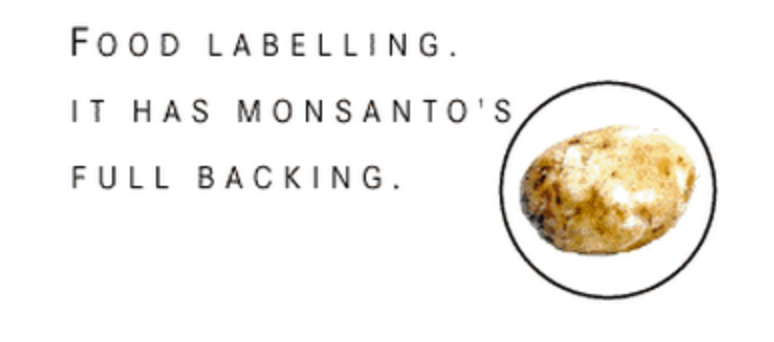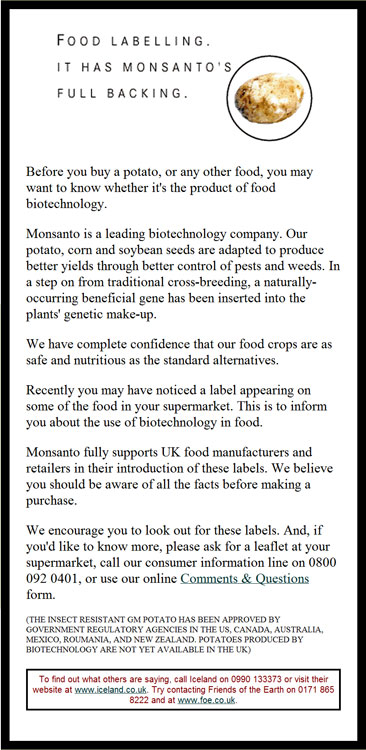 I have just returned from Europe. This is my third trip in recent years. What amazes me beyond the history and culture is I can eat whatever I want. I stick to my vegetarian diet, but I eat pastries, pasta, pizza, cheese, milk in my cappuccino, etc. If I ate like that in the United States, I would gain weight, my digestion would slow down, and I would feel bad. What is the difference?
I have just returned from Europe. This is my third trip in recent years. What amazes me beyond the history and culture is I can eat whatever I want. I stick to my vegetarian diet, but I eat pastries, pasta, pizza, cheese, milk in my cappuccino, etc. If I ate like that in the United States, I would gain weight, my digestion would slow down, and I would feel bad. What is the difference?
In 1997 the European Union enacted mandatory genetically modified food labeling. This law has been updated many times over the past 18 years.
The European Union has established a legal framework to ensure that the development of modern biotechnology, and more specifically of GMOs, takes place in safe conditions.
The legal framework aims to:
- Protect human and animal health and the environment by introducing a safety assessment of the highest possible standards at EU level before any GMO is placed on the market.
- Put in place harmonised procedures for risk assessment and authorisation of GMOs that are efficient, time-limited and transparent.
- Ensure clear labelling of GMOs placed on the market in order to enable consumers as well as professionals (e.g. farmers, and food feed chain operators) to make an informed choice.
- Ensure the traceability of GMOs placed on the market
Ironically, the company that has spent $22 million to fight state initiatives for GMO labeling in the US actually supported GMO labeling in the EU!
…or at least they tried to fool consumers into thinking they did.
Monsanto a company responsible for untold harm to human health, social degradation, and environmental damage ran ads in support of GMO mandatory labeling in the EU. The text of the ad reads:
Before you buy a potato, or any other food, you may want to know whether it’s the product of food biotechnology…We have complete confidence that our food crops are as safe and nutritious as the standard alternatives. Recently you may have noticed a label appearing on some of the food in your supermarket. This is to inform you about the use of biotechnology in food. Monsanto fully supports UK food manufacturers and retailers in their introduction of these labels. We believe you should be aware of all the facts before making a purchase.[1] (Via: US Right to Know)

Why do European consumers deserve to know how their food is produced more than Americans?
When you visit the EU, you do see many American brands. Due to strict GMO laws, including many outright bans, American companies make two versions of their products: a GMO-free version for the EU and a GMO version for the US. One such example is General Mills popular cereal Cheerios:
Despite its refusal to do so at home, General Mills already offers GMO-free Cheerios in Europe … even as it incorrectly describes Cheerios sold in the U.S. as consisting of “natural” ingredients. To make matters worse, General Mills postures as a leader in corporate CSR, even as it pours over one million dollars into campaigns designed to prevent consumers from getting information about which food products contain GMOs. (Via: Biz Journals)
26 countries have banned GMOs, including Italy where I traveled. Can this explain why I can tolerate foods that give me trouble in the US? I eat 90% organically, which should protect me from GMO crops, but maybe cross-contamination is greater than we thought.
So why did Monsanto change its tune on GMO-labeling after supporting it in the EU? Why has it spent millions so we don’t know what is in our food? Monsanto‘s response to this very question:
Monsanto has always supported voluntary labeling. We believe food companies and retailers should be able to provide the information they believe interests their customers – as long as it is truthful and not misleading.
- Consistent with our support for voluntary labeling, we ran an ad in the United Kingdom in the 1990s to support the voluntary effort of retailers to provide information they believed would be of interest to their customers.
- In the United States today, we continue to be 100% supportive of food companies’ choices to voluntarily label food to meet the needs and desires of their customers. Today, hundreds of products labeled organic or certified non-GM are available for consumers who prefer these products. This approach provides choices for every consumer, making it easy to find specific products like organic and non-GM, and does so without risking consumer confusion.
So what has changed? Proponents of labeling initiatives in the United States today are misleading consumers about the safety of GM foods, and have admitted that their goal is not just to require a label on such foods, but to ultimately ban these foods altogether. These proponents are waging a campaign of fear tactics and misinformation about the safety and benefits of these crops. While we respect that some people may choose to avoid GM ingredients, it is wrong to mislead and scare people about the safety of their food choices.
The real truth of the matter is that Monsanto’s EU ads claiming support of GMO labeling came after the law was implemented. It was a marketing strategy to assure consumers of the safety of their products.
It was an effort to diffuse the impact of the law on business. Natural News writes:
Fast forward to 2012; however, and Monsanto is doing everything it can to stop GMO labeling laws from being enacted in California or elsewhere in the U.S. Why Monsanto pushed so heavily in favor of GMO labeling in the U.K. a little more than a decade ago, but is now so vehemently against GMO labeling in the U.S., is not entirely clear. But it likely has something to do with the dozens of GMO safety studies that have since emerged linking biotechnology to organ damage, reproductive problems, autoimmune disorders, and cancer.
It also probably has something to do with the fact that Monsanto’s pro-GMO labeling ads in the U.K. arrived after GMO labeling laws had already been enacted across Europe. If GMOs were going to be labeled anyway, why would Monsanto not attempt to spin the situation and make it appear as though the company not only approves of GMO labeling, but also endorses it? Such tactics are common among corporations.
It’s all about profits.
Since 2000, Monsanto’s stock market value has grown nearly tenfold. And Monsanto expects that it will continue to flourish. For example, in 2014 the company announced that it expects to double its earnings in the next five years. According to John Roberts, executive director of chemical equity research for UBS, Monsanto’s “confidence level is off the charts… They feel they have as deep a growth pipeline as they’ve had in a long time.” More generally, financial analysts at Transparency Market Research project that the global agricultural biotechnology market will nearly double in seven years, from $15.3 billion in 2012 to $28.7 billion in 2019.(Via: US Right to Know)
If you want to learn what happens when a country fully embraces Monsanto’s lies, research Paraguay.
Via: Just Label It
I just noticed the spelling of “labelling”. Apparently in the UK they use two ls
In the US Monsanto supports a federal labelling initiative, just not a state to state witch hunt.